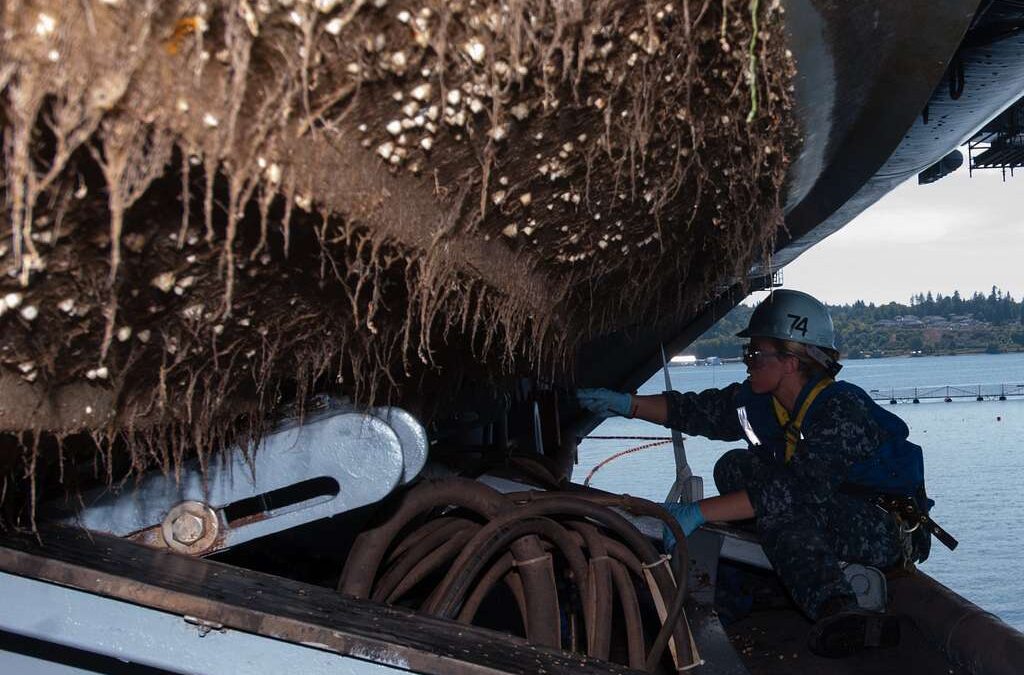The build-up of marine life on ships’ hulls, known as biofouling, is an age-old problem for ship operators and the shipping industry. A new international effort initiated by NGO Bellona and supported by leading companies aims to develop an industry standard for proactive hull cleaning to tackle this issue.
Severe underwater biofouling slows the affected ship and can increase its fuel consumption by as much as forty per cent, boosting emissions. In addition, the accumulation of marine life may cause the spread of invasive aquatic species in environments they’re transported to, affecting biodiversity, ecosystem health and the livelihoods of coastal communities. It’s something that regulators, ship operators, port authorities and conservation bodies are increasingly concerned about.
Also read: Tackling biofouling: Hull must be clean for shipping to be green
Clean Hull Initiative
The environmental NGO Bellona Foundation has now launched the Clean Hull Initiative (CHI) to address the biofouling issue.
‘The CHI brings together a growing number of stakeholders in both the private and public sectors and aims to develop an industry-wide recognised and accepted standard for proactive hull cleaning which currently does not exist,’ says Bellona’s project manager Runa Skarbø. ‘We believe the standard is an important means to establish proactive cleaning as part of the biofouling management toolbox and will also drive innovation and the market for commercial proactive hull cleaning solutions.’
Frederic Hauge, founder of the Bellona Foundation, adds: ‘Together we will seek to sort out the regulatory barriers currently in the way of solving the biofouling issue. Also, we want to reduce barriers for the further uptake of emerging proactive hull cleaning technology as a preventative tool.’
Also read: Study says anti-fouling is major source of marine microplastics pollution
Focus on proactive cleaning
There are of course other collaborations and initiatives that seek to tackle the biofouling issue, but Skarbø points out the CHI is unique in the sense that it is addressing proactive cleaning issues. She says regulatory inconsistencies worldwide create a major barrier to ship operators wanting to manage biofouling proactively, and for in-water cleaning (IWC) providers operating in multiple locations.
Compounded by the absence of any international regulation or standard for hull cleaning, today there is no international regulating body for ports and anchorages where IWC takes place. Local biofouling and/or IWC management guidelines vary hugely, if they exist at all.
Also read: MSC buys hull cleaning robot for 14,000 TEU container ship
Revision of IMO biofouling guidelines
The International Maritime Organization (IMO) is currently revising its biofouling guidelines.
Sveinung Oftedahl, specialist director in the Norwegian Ministry of climate and environment: ‘The revision of the guidelines is currently being undertaken by a dedicated sub-committee and the work is progressing well, with completion targeted next year.’
According to him, the key goal is to increase uptake and effectiveness of the guidelines: ‘The intention is to make the guidelines clearer and less general meaning “specific recommendations on what to do, how to do it, when to do to it” as well as include user-specific guidance and allocate clearly the responsibilities of various stakeholders. Moreover, the guidelines are to reflect chronological sequence from ship design to end of service life.’
Also read: Dutch naval landing craft equipped with ultrasonic anti-fouling
CHI stakeholders
The CHI stakeholder members currently include Jotun, iKnowHow, Armach Robotics, Notilo Plus, Hapag-Lloyd, Wallenius Wilhelmsen, DNV, the Mærsk Mc-Kinney Møller Centre for Zero Carbon Shipping, Litehauz, Port of Antwerp Bruges, ShipShave, VesselCheck, LimnoMar, Endures, CleanSubSea, the University of Maryland Center for Environmental Science (Alliance for Coastal Technologies and Maritime Environmental Resource Centre, ACT/MERC) and University of Strathclyde.








